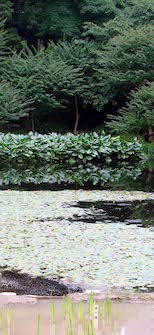Jodo Wasan 92
When a person realises the mind of nondiscrimination,
That attainment is the 'state of regarding each being as
one's only child.'
This is none other than Buddha-nature;
We will awaken to it on reaching the land of peace.
The Religion of the Books

This verse is the second, in a sequence of three that are based on the Nirvana Sutra. The 'state of regarding each being as one's only child' is an allusion to the mind of equality towards all sentient beings. This understanding pertains to realised bodhisattvas, since they relate to all sentient beings in light of their knowledge that the constituents of existence (Sk. dharmas) are 'empty' (Sk. shunya).
Needless to say, Shinran Shonin is eager to bring us back to earth in both this and the next verse by reminding us that we do not accomplish such a sublime level of spritual awakening in this mundane life. Not until we reach the Pure Land, the land of peace (annyokai) do these truths become evident to us. Although, in the path of sages, the Pure Land is often treated as a kind of consciousness within this mundane existence - attesting to a level of enlightenment on the part of the disciple - the Pure Land way does not see it like that.
Within the Jodo Shinshu tradition there is a small collection of exquisite verses, attributed to Shinran, where he suggests that, although dwelling in the world, his mind dwells in the Pure Land. Although I have been told these verses are considered to be of doubtful origin, even so, they do not suggest that Shinran's mind was identified with the Pure Land in the way such an idea is understood in the Path of Sages. Rather, the opposite is true.
In the Hymns of All Buddhas' Presence, Shan-tao, the Master of Kuang Ming temple, explains that the heart of the person of shinjin already and always resides in the Pure Land. 'Resides' means that the heart of the person of shinjin constantly dwells there.1
Rather than the Pure Land being encompassed by our mind, our mind is enfolded in the Pure Land.
Needless to say, what we know and experience falls short of the fullness of awakening and enlightenment. Shinran took great care to make sure that people understand that upon awakening to Amida Buddha's shinjin beings enter the stage of the truly settled in this life and become buddhas when it ends.
In my last essay I suggested that we can approach the dharma of which we have only partial knowledge and limited understanding by way of the certainty we have found in the initial propositions of the teacher. This may serve as the basis of trust for our further development in areas, which are as yet unclear to us. But this does not in itself afford a sufficient basis for us to proceed along the path. Who is to say that the teacher is not a deluded ego-maniac who gains his own sense of value and self-importance by controlling others? T'an-luan once pointed out that being misled by deceivers whose teaching only resembles the truth is an ever-present danger for the disciple of the dharma.2
There is, however, a foil for this danger; and that is to be found in the high authority and reverence that the Buddhist tradition bestows upon its sacred scriptures.
Sutras are more than mere written documents. They are the embodiment of the teacher, and Buddhas. Thus the Larger Sutra is an embodiment of Shakyamuni; and the twentieth century Pure Land Master, Zuiken (Saizo) Inagaki (1885-1981) was able to describe the Kyo Gyo Shin Sho as Shinran's dharma body. I genuinely think that, when we read it, we are indeed engaging directly in a dialogue with the living Shinran, who said,
When you alone rejoice in Faith know that you are with another. When you two rejoice in Faith, know that there is still another accompanying you. I, Shinran, am that 'other' person.3
Exponents of Buddhism often overlook the importance of sacred texts but I think that it is most reassuring to understand that they are the first and last recourse in our acceptance of, and progress in, the dharma. We should never be without them and we are wise to hold them in immeasurably higher esteem than any person or thing that belongs to the saha world.
From this day on rely on dharma, not people who teach it. Rely on the meaning, not on the words.4
Namo Amida Butsu
1: CWS, p. 528.
2: CWS, p. 25.
3: Hanazono Bunko.
4: Nagarjuna Bodhisattva: CWS p. 241.